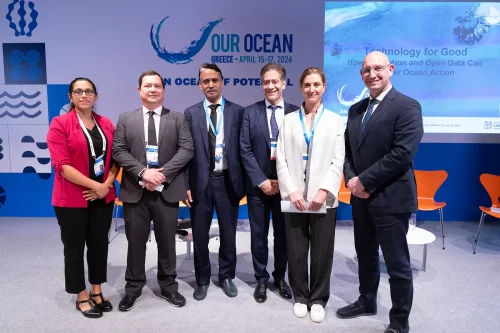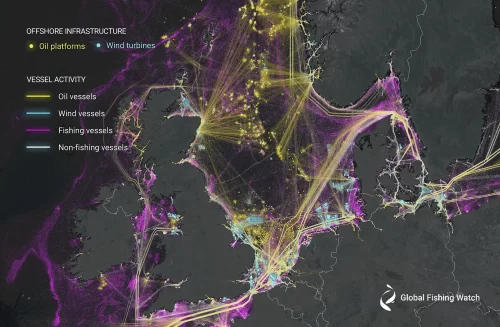New research fuses multiple data sources to advance understanding of the expanding footprint of global squid fleets
Scientists and policymakers have voiced growing concerns about the decline of global squid stocks, but little has been done to date to target squid fishing activities that are expanding into unregulated spaces, according to a new international study.
The study, lead-authored by Katherine Seto, an assistant professor of environmental studies at the University of California, Santa Cruz, was published in Science Advances on March 10. It explores the unregulated nature of global squid fisheries across three oceans over a three-year period, and how these fisheries continue to grow and shift locations beyond the jurisdiction of management bodies. The research was conducted through a research partnership between Global Fishing Watch, the Australian National Centre for Ocean Resources and Security at the University of Wollongong, and the Japan Fisheries Research and Education Agency.
Using satellite imagery, vessel tracking, and data monitoring, the study found that the fishing conducted by this globalized light-luring squid fishery was extensive, fishing between 149,000-251,000 vessel days annually, and that effort increased 68% over the study period from 2017-2020.
“These squid fisheries are highly mobile, fishing multiple oceans within a given year,” said Seto. “While some conservation and management measures are in place to regulate this type of fishing, our research found that actors may take advantage of these fragmented regulations to maximize resource extraction. To address this, we need to address the factors that promote the growth and expansion of fishing efforts, and increase data sharing and communication between management entities.”
The study found that these squid fishing vessels fished largely (86%) in unregulated areas, equating to 4.4 million total hours of fishing time between 2017-2020. While unregulated fishing is not necessarily illegal, it presents challenges for fisheries sustainability and resource equity, and has been connected to questionable human rights and labor practices.
“By synthesizing data from multiple sources, we created a robust picture of the fishing activity of the high seas squid fleets. Our analysis highlights the interconnectedness of fishing grounds used by the fleets,” said Nate Miller, head of applied research at Global Fishing Watch and co-author of the study. “It demonstrates the critical importance of comprehensive data sharing agreements between regional bodies for improving understanding of the movements of these vessels and quantifying their impacts on squid stocks.”
One major challenge has been the vessels freely fishing between regulated and unregulated spaces, fishing huge amounts of squid with little to no oversight or data reporting. Fishing in unregulated areas has also steadily increased and seems to be preferred despite concerns over stock status, according to the study.
“These unregulated fishing activities require urgent action. They occur in our global commons, shared by all, yet few receive any benefit, and neighboring coastal States are increasingly concerned regarding the impact on their own shared fish stocks,” said study co-author Quentin Hanich, from the University of Wollongong.
Masanori Miyahara, a co-author and advisor to the Minister of Agriculture, Forestry and Fisheries of Japan, agrees.
“These catches are often not reported to domestic or international management bodies, nor are they incorporated into estimates of fishing effort, harvest, or stock status,” said Miyahara. “While it is good to see both the North Pacific Fisheries Commission and the South Pacific Regional Fisheries Management Organisation strengthen their management, urgent responses are also required in the Indian and Atlantic Oceans to ensure that fleets do not simply evade regulation by moving elsewhere.”
As we experience an increased demand for seafood products globally, we must understand the factors that facilitate the increase and expansion of fishing efforts to address the challenges of unregulated fishing, according to the study.
“Like all activities in the global commons, fishing on the high seas should be fully regulated. Yet the regional bodies with the competence to adopt management measures are restrained by a handful of states whose self-interests are best served when such activities are unregulated or done with few limits,” said Osvaldo Urrutia S., professor of international law at Pontificia Universidad Católica de Valparaíso in Chile. “The global squid fishery shows how important it is to strengthen regional management of high seas resources and to continue international calls for states and regional bodies to take this challenge seriously.”
Notes to the editor:
- Download research paper summary (PDF).

